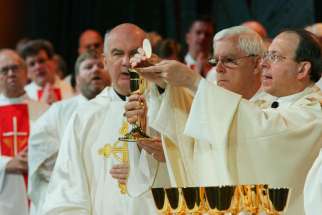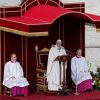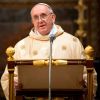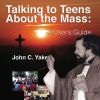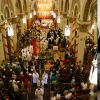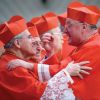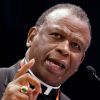French Mass survives CBC cuts
CBC budget cuts in April that will cost more than 600 employees their jobs left the weekly Mass in French relatively unscathed.
VATICAN CITY - In the humble act of washing his disciples' feet, Jesus is showing all Christians how he wants them to serve others with love, Pope Francis said.
VATICAN CITY - Pope Francis has decided to celebrate the Holy Thursday Mass of the Lord's Supper in a Rome juvenile detention facility and wash the feet of some of the young detainees.
VATICAN CITY - Without faith in Christ's sacrifice on the cross, the Church is nothing more than a "pitiful NGO," Pope Francis said in his first homily as Pope.
In Holy Land, Christmas traditions include family, parades and Mass
World Youth Day vigil, Mass to be in neighborhood known for its beaches
SAO PAULO (CNS) -- World Youth Day organizers have chosen a spot in Rio de Janeiro's Guaratiba neighborhood, nearly 60 miles from the city center, for the vigil and closing Mass July 27-28.
Pope calls Middle Eastern Christians to promote peace through service
BEIRUT - Pope Benedict XVI acknowledged the suffering of Christians in the Middle East, reassuring them and urging them to promote peace through religiously inspired service to their societies.
"Your sufferings are not in vain," the pope told a crowd of at least 350,000 at a sweltering outdoor Mass at Beirut's City Center Waterfront Sept. 16. "Remain ever hopeful because of Christ."
In his homily, Pope Benedict commented on the day's reading from the Gospel of St. Mark, in which Jesus foretells his death and resurrection. Jesus is a "Messiah who suffers," the pope said, "a Messiah who serves, and not some triumphant political savior."
Speaking in a region riven by sectarian politics, where party loyalties are often determined by religious affiliation, the pope warned that people can invoke Jesus to "advance agendas which are not his, to raise false temporal hopes in his regard."
Pope Benedict told his listeners, whose travails of war and economic insecurity he had acknowledged repeatedly throughout his visit, that Christianity is essentially a faith of redemptive suffering.
"Following Jesus means taking up one's cross and following in his footsteps along a difficult path which leads not to earthly power or glory but, if necessary, to self-abandonment, to losing one's life for Christ and the Gospel in order to save it," he said.
Yet Pope Benedict also cited another of the day's Mass readings, the epistle of St. James, to emphasize the spiritual value of "concrete actions" and works, concluding that "service is a fundamental element" of Christian identity.
Addressing a region where Christian-run social services, including schools and health care facilities, are extensively used by the Muslim majority, the pope stressed the importance of "serving the poor, the outcast and the suffering," and called on Christians to be "servants of peace and reconciliation in the Middle East."
"This is an essential testimony which Christians must render here, in cooperation with all people of good will," Pope Benedict said.
During the homily, the only sound was the pope's voice and its echo from the loudspeakers. Many people leaned over and bowed their heads with eyes closed, so they could concentrate more deeply.
Following the Mass, the pope formally presented patriarchs and bishops of the Middle East with a document of his reflections on the 2010 special Synod of Bishops, which was dedicated to the region's Christians. In the 90-page document, called an apostolic exhortation, the pope called for religious freedom and warned of the dangers of fundamentalism.
Sheltered from the sun only by white baseball caps and the occasional umbrella, people had already packed the city's central district by 8 a.m., almost an hour-and-a-half before the pope arrived in the popemobile, which took him to the foot of the altar. In temperatures that rose into the high 80s, the pope celebrated Mass under a canopy while bishops and patriarchs on either side wiped their brows and fanned themselves with programs.
Aside from the complimentary white pope caps, people in the crowd improvised versions of sun protection with torn pieces of corrugated boxes tied around heads and papal and Lebanese flags worn as bandanas.
George Srour, 38, estimated that 20,000 people came from Zahle in a convoy of chartered school buses, leaving at 5 a.m. for the 10 a.m. Mass.
"We Christians must be united and participate" in the pope's visit, Srour told Catholic News Service, "otherwise there will be no more Lebanon. It will become like Iraq, and now Syria, with all the Christians leaving."
- - -
Contributing to this story was Doreen Abi Raad.
New musical Mass settings remain a work in progress
Sept. 25, 2011 marked the launch of the newly minted musical settings that followed the complete liturgical overhaul of the Roman missal.
In parishes around the archdiocese of Toronto, congregants were greeted with the small, floppy Celebrate in Song hymnal — a book that contains three freshly commissioned musical settings of the Mass. Much like the often overlapping of the spoken “and with your spirit” with the erstwhile “and also with you,” the musical settings presented congregants with a fresh challenge — adapting responses that had been previously learned en rote to a completely different, and sometimes complex, vocal line.
“I think that for people, change is death. Change is a metaphor for death. Nobody likes change,” said Peter Togni.
Togni is one of Canada’s most noted composers, and his choral works are heard in parishes across the world. Having set the Mass to music before, Togni provides an interesting view on the musical tradition that some congregants are still adapting to.
“I think the language that they’re using, in many cases, is more elegant and more directly translated from the original Latin, which goes back to what Paul VI really wanted,” said Togni.
“But, I understand the paradox, because in some ways there’s kind of a wooden link to Latin for some people — the sacrilization of Latin, almost, just for its own sake and I understand that this gets in the way of ecumenism for some people. But, from an artistic standpoint, setting the text to those words is in some ways easier and prettier, you know? ‘Lord, God of Hosts’ is easier than ‘Lord, God of Power and Might.’ I like that from a purely artistic standpoint.”
However, the adaptation, despite what may seem a more poetic version, hasn’t necessarily lent itself in all cases to the accompanying musical line. Thus, there lies an imperfect synthesis of text and music which is crucial to the participation of the congregants.
“One of them that I’ve heard, I find very awkward,” said Togni. “In the congregation that I go to now, the congregation doesn’t sing very much with one of the Mass parts because there’s so much for them to do that I find it’s overwhelming for them, and frankly, most people don’t sing.
“I think it’s the integration with the music and that text,” Togni said of what may be the inherent problem with the adjustment to the changes.
“I think different composers might have done different things with that text. Not that the text is perfect… you can get in sort of a dualistic all or nothing thinking — this is totally right, that’s totally wrong. I don’t think you can do that.”
Togni does note that the textual changes certainly serve to unite the Church across the country.
“You’re talking about universality, right? The beautiful thing about the new text, if we’re asked, is, for the French they always say ‘avec votre esprit.’ We now say, ‘and with your spirit,’ but the French have been saying it for years. So, it links us up with them,” said Togni.
Looking forward, Togni suggests that perhaps the music will adopt a more Gregorian tradition and create a solid chant-like structure that would accommodate and highlight the textual changes.
“Even if you read the Vatican documents, the chant is supposed to have lots of room. We had an opportunity to write an English setting that I think could have been more people friendly and more chant-like,” said Togni.
“No matter what you do to ‘people of goodwill,’ it’s hard to set. But, then, English is cumbersome anyway,” he laughs. “I get the sense that there’s something sort of artificial with what they ended up with.”
It’s not entirely unsuccessful, though. In particular, the Angeles “Agnus Dei” has been particularly well received by congregations that Togni’s witnessed, and musically well executed.
Despite that, perhaps the root of any musical problem in the liturgy lies with what could be described as a lagging musical culture in the Catholic tradition.
“Church choir attendance is getting smaller and smaller and smaller, in some places,” said Togni.
“In our culture, we’re not a singing people. We’re just not… I think we need to find a Mass setting that’s more people friendly, melodically; simpler rhythmically. Let’s face it — not many people sing any more.”
Another factor of the tradition that could be remedied is a less performance-like aspect to the melodic line, which would allow the cantor to interact more thoroughly with the congregants, some of whom may be averse to singing entirely, he said.
“In the Gloria, for example, I don’t know why there isn’t more refrain for the people and then the cantor or the choir can do the rest of it,” said Togni.
“It’s just so much easier. If you’re going to have the entire text, then you better make it singer friendly, and it’s not,” said Togni, who notes that some of the song selections in Celebrate in Song lend themselves well to congregant participation.
Hopefully, the new settings will entrench themselves in the musical tradition. That, or adapt to what the congregants need.
“What is that Latin phrase? ‘Lex orandi, Lex credendi’: the law of prayer is the law of belief — what we say in prayer expresses what we believe. That’s really the crux of it,” said Togni.
“It doesn’t sound like an entirely successful experiment, artistically, so far. Not yet.”
The Mass shows a young person’s dignity is from God
“Why do I need to go to Mass?” Every Catholic has heard that line before, especially when uttered by teenagers and young adults. We’ve also heard virtually every excuse on why not to go to Mass. But how do we convince sceptics of the Mass’ importance and contemporary relevance?
In Talking to Teens About the Mass: A User’s Guide, Fr. John C. Yake seeks to tackle this loaded question, offering rebuttals against the common alibis for not attending Mass regularly. In the process, he demonstrates that contrary to the misperception of the Mass as an outdated, old-fashioned and boring ritual, the Eucharist and the Catholic Church are still very relevant to the contemporary struggles of teenagers.
WASHINGTON - Harvard public policy professor Robert D. Putnam has a tongue-in-cheek suggestion for pastors: "Spend less time on the sermons, and more time arranging the church suppers."
That's because research by Putnam and Chaeyoon Lim, assistant professor of sociology at the University of Wisconsin-Madison, shows that the more church friends a person has, the happier he or she is.
"Church friends are super-charged friends, but we have no idea why," Putnam told a Feb. 16 summit on religion, well-being and health at Gallup world headquarters in Washington. "We have some hypotheses, but we don't know for sure."
Sunday’s shifting solemnities
VATICAN CITY - Consistories for new cardinals are usually held on major feasts, and the most recent one had a lesson for the liturgical life of parishes.
Blessed John Paul II held six of his nine consistories on Petrine feasts — three for Sts. Peter and Paul (June 29), two for the Chair of Peter (Feb. 22) and one for his silver jubilee as Successor of Peter in October 2003. Benedict held his first consistory in 2006 on the Feast of the Annunciation, and his next two on Christ the King in 2007 and 2010. This year he chose the Chair of Peter, the feast which highlights the role of Peter and his successors in authoritatively teaching the deposit of the faith.
BELLEVILLE, Ill. - Bishop Edward K. Braxton of Belleville said he did not "fire" a priest from his pastorate for using his own wording in some parts of the Mass but was obligated to correct the situation as shepherd of the diocese.
The bishop accepted the resignation of Father William Rowe, pastor of St. Mary Parish in Mount Carmel for the past 17 years, after several meetings with the 72-year-old priest over the last five years failed to resolve the bishop's concerns about how Father Rowe celebrated the Mass, especially after the implementation of the new Roman Missal in late November.
Lapsed Catholics invited to take another look
MAPLE RIDGE, B.C. - St. Luke’s parish in Maple Ridge recently invited 8,200 people, give or take a few thousand, to dinner.
That number, says a media release from their office, represents the one-fifth of the local population who are lapsed Catholics.
“Those of us who live our faith take great comfort in it,” said Vernon Robertson, a parishioner and the organizer of the event, a “full meal deal” entitled Discovering Christ.


